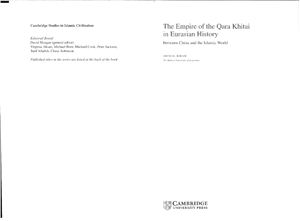Cambridge University Press, 2005 - 300 p. ISBN10: 0521842263
ISBN13: 9780521842266 (eng)
The empire of the Qara Khitai, which was one of the least known and most fascinating dynasties in the history of Central Asia, existed for nearly a century before it was conquered by the Mongols in
1218. Arriving in Central Asia from China, the Qara Khitai ruled over a mostly Muslim population. Their history affords a unique window onto the extensive cross-cultural contacts between China, Inner Asian nomads and the Muslim world in the period preceding the rise of Chinggis Khan. Using an extensive corpus of Muslim and Chinese sources, Michal Biran comprehensively examines the political, institutional and cultural histories of the Qara Khitai. Her book explores a range of topics including the organization of the army, the position of women, the image of China in Muslim Central Asia,the religions of the Qara Khitai and the legacy they left for the Mongols. Crucially she asks why they did not, unlike their predecessors and successors in Central Asia, embrace Islam. The book represents a groundbreaking contribution to the field of Eurasian history for students of the Islamic world, China and Central Asia.
The empire of the Qara Khitai, which was one of the least known and most fascinating dynasties in the history of Central Asia, existed for nearly a century before it was conquered by the Mongols in
1218. Arriving in Central Asia from China, the Qara Khitai ruled over a mostly Muslim population. Their history affords a unique window onto the extensive cross-cultural contacts between China, Inner Asian nomads and the Muslim world in the period preceding the rise of Chinggis Khan. Using an extensive corpus of Muslim and Chinese sources, Michal Biran comprehensively examines the political, institutional and cultural histories of the Qara Khitai. Her book explores a range of topics including the organization of the army, the position of women, the image of China in Muslim Central Asia,the religions of the Qara Khitai and the legacy they left for the Mongols. Crucially she asks why they did not, unlike their predecessors and successors in Central Asia, embrace Islam. The book represents a groundbreaking contribution to the field of Eurasian history for students of the Islamic world, China and Central Asia.

